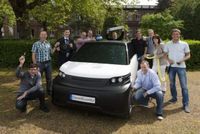The StreetScooter - Electric Mobility Made in Aachen
FRANKFURT, Germany, 15 September - With the StreetScooter, RWTH Aachen University presents a new approach to electric mobility which is both cost-effective and environmentally friendly. In close collaboration with partners from industry, Professor Achim Kampker of the Laboratory for Machine Tools and Production Engineering (WZL) is developing a new type of electric car.
The vehicle concept integrates novel vehicle and production technologies as well as innovative battery management and financing solutions. For the series production electric car "made in Aachen," a price of around €5,000 ($7,140) is envisaged, battery leasing costs excluded.
"We want to draw attention to two aspects of our e-mobility project that so far have not been widely communicated," says Professor Kampker: "First, we involve small to medium enterprises in our project. Through their participation, these companies gain experience and expertise in highly complex development and production processes. Second, we share the knowledge gained in this project with industry, so that even the large automakers can benefit from our work."
In Kampker's view, this also improves the competitiveness of Germany as a location for production. Involving the SME Sector
But how exactly does this work? The companies and research groups involved in the project are using an open technology platform to investigate the boundary conditions of a car development process without the participation of a large automaker. Collaboration begins with brainstorming and sketching and ends with questions of producibility. "In this way the development process can be scientifically analysed and guided," explains Kampker.
For the mechanical engineering professor, the continuity of research in the development process up to the start of production is of great importance, as it ensures that the entire process chain in all its complexity and with its mutually interacting elements is fully comprehended.
Further, a thorough scientific understanding of the process increases the partners' competitiveness and ensures that the generated knowledge is disseminated throughout the entire industry. "To put it differently: Through this collaboration we enable small to medium enterprises to develop the technological capabilities required for future vehicle design and production."
"Integrated product and process planning will be a key factor to decide whether or not Germany will remain competitive in the future," emphasises Professor Kampker. It is exactly this kind of integrated approach that has proved to be successful in RWTH's cluster of excellence, "Integrative Production Technology for High-Wage Countries" – an approach that is now being transferred to the StreetScooter project.
"If you do not investigate all the options for the production process in the early stages of product development, then many subsequent costs and techniques are already predetermined. You are unnecessarily limiting your options," explains Kampker. "Our new approach makes it possible to optimise the entire process, in that each step is examined in terms of its consequences for the later stages."
It is consistent with this approach that the vehicle will first be produced in small batch quantities for verification and testing. According to Kampker, this is a unique selling point of the Aachen approach. The StreetScooter – Minimum Costs, Maximum Know-How
Most electric cars currently available on the market are converted combustion engine vehicles. The Aachen scientists follow a different approach: The StreetScooter is being developed from scratch and demonstrates the value of 'purpose design': the aim is to develop a safe and reliable car for use in an urban environment, which is both cost-efficient and fun to use.
To realise these objectives, researchers from various disciplines are involved in the project: "This type of development project can only be realised by drawing on interdisciplinary expertise. The University offers all the expertise we need for our concept, ranging from the required engineering disciplines to the relevant business and economics disciplines," explains Fabian Schmitt, the Director of RWTH's Agency for Electric Mobility. Innovative Solutions for the Electric Car
This goal-oriented approach and the close cooperation with partners from industry has resulted in a number of innovative solutions. From the beginning of the project, cost-efficiency was a major consideration.
For example, the StreetScooter will be equipped with a modular battery system mounted in the vehicle's underbody. The ion-lithium batteries are produced by a medium-sized company located in Lübeck. Customers are able to choose whether they need one, two, or three batteries: each battery provides a cruising range of about 45 km (28 miles). In this way, customers have the chance to adapt the vehicle to their needs – a useful option considering the fact that most daily drives are less than 10 km (6 miles).
Car owners also don't have to be concerned about issues such as battery lifetime and recycling, as the batteries for the car are leased, and not purchased.
Concerning passenger comfort and safety, no compromises were made: The vehicle comes with two front airbags, anti-lock braking system (ABS) and electronic stability programme (ESP). The batteries have a voltage of 60V, which poses no danger to occupants or rescue workers in case of an accident, and garage staff also do not require special training.
Also, the vehicle is equipped with an intelligent thermal management system to ensure pleasant temperatures in the passenger compartment – this is necessary as the energy consumption of a standard air conditioning system would be too high at more extreme temperatures, both cold and warm. StreetScooter Variants: Also as Convertible
The StreetScooter prototype will be a three-plus-one seater with room for a child seat. The modular system as well as the car body, which consists of several steel sections and whose length can be adjusted without much difficulty, make it possible to produce derivatives, such as a two-seater, a convertible, or a compact utility vehicle.
Wherever possible, standard parts are being used, with slight modifications where necessary – this helps to reduce costs. Also striving for cost efficiency, the innovative production strategy envisages only about 20 instead of the usual 100 assembly stations.
(Editor's note: the StreetScooter was shown at the 2011 Frankfurt Motor Show. This press release has been published earlier)



